may-top.html
.
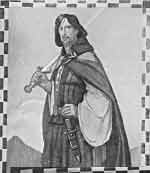 1567 Shane O’Neill and his army fled across the Swilly estuary on this day in 1567. O’Neill was king of the O’Neill dynasty in Ulster, and had to defend his territory from Hugh O’Donnell, leader of the O’Donnell clan who ruled much of Co Donegal. O’Neill lost this battle with hundreds of his men drowning as they tried to escape.
1567 Shane O’Neill and his army fled across the Swilly estuary on this day in 1567. O’Neill was king of the O’Neill dynasty in Ulster, and had to defend his territory from Hugh O’Donnell, leader of the O’Donnell clan who ruled much of Co Donegal. O’Neill lost this battle with hundreds of his men drowning as they tried to escape.
Click here to read more about the history of the O’Neill name
Click here to read more about the history of the O’Donnell name
Click here to read about the history of more Irish names
* * *
1889 The Countess Cathleen by WB Yeats is performed on stage for the first time at the Irish Literary Theatre on this day in 1899.
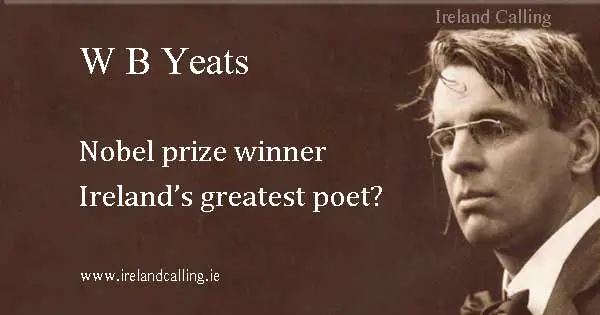
The play is set in Ireland during the ‘Great Famine’, and tells the story of an idealistic woman who sells her soul in order to save the starving peasants. Once she dies, she ascends into heaven because her motives were good.
Click here to read more about WB Yeats
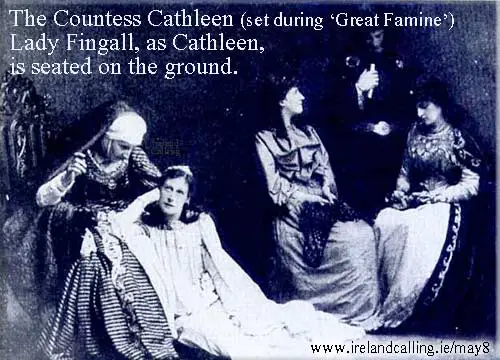
* * *
1916 Eamonn Ceannt, Michael Mallin, Seán Heuston and Conn Colbert were executed at Kilmainham Gaol on this day in 1916. The men had been involved in the Easter Rising, in which Irish nationalists fought against the British army to take control of Dublin.
The rebels surrendered after Padraic Pearse gave the order, as he was aware that they were severely outnumbered and to continue fighting would only lead to more bloodshed.
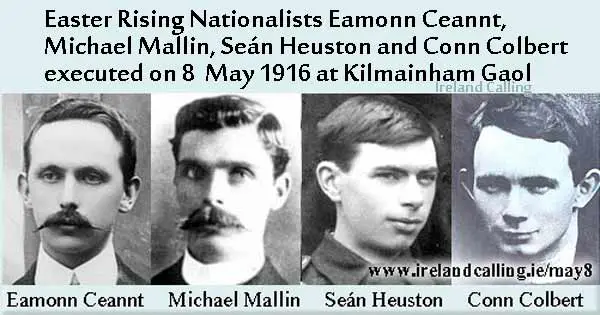
Here is an account of the conflict, written by Séamus Brennan who was one of the men under the command of Seán Heuston:
“Our tiny garrison twenty-six—had battled all morning against three or four hundred British troops. Machine-gun and rifle fire kept up a constant battering of our position. Seán visited each post in turn, encouraging us. But now we were faced with a new form of attack. The enemy, closing in, began to hurl grenades into the building.
“Our only answer was to try to catch these and throw them back before they exploded. Two of our men, Liam Staines and Dick Balfe, both close friends of Seán’s were badly wounded doing this. We had almost run out of ammunition. Dog-tired, without food, trapped, hopelessly outnumbered, we had reached the limit of our endurance.
“After consultation with the rest of us, Seán decided that the only hope for the wounded and, indeed, for the safety of all of us, was to surrender. Not everyone approved but the order was obeyed and we destroyed as much equipment as we could before giving ourselves up.”
Click here to read more about the Easter Rising
* * *
1935 Jack Charlton was born in Northumberland on this day in 1935. He was a footballer and won the World Cup with England in 1966. He later went on to manage the Republic of Ireland national side, and led them to their first major finals at the European Championships in 1988.
Charlton also led Ireland to their first World Cup finals two years later and the team impressed as they reached the quarter finals. Charlton led Ireland to the World Cup finals again in 1994, where they produced one of their most famous victories, a 1-0 win over Italy.
As well as producing an Ireland team that was competitive with the world’s elite, Charlton’s tenure as Ireland boss is also noteworthy because of his selection policy. He picked several players who were not Irish-born, but were the sons or grandsons of Irish emigrants.
Ray Houghton was born in Scotland and John Aldridge was born in Liverpool, but both were of Irish descent and played key roles for Ireland at the 1994 World Cup. There were several more members of the squad with similar backgrounds. The captain of the team was English born Andy Townsend.
Charlton was criticised by some members of the British media for this policy, with him being accused of playing an ‘England B team’. Here is a quote from Charlton in his response to the criticism:
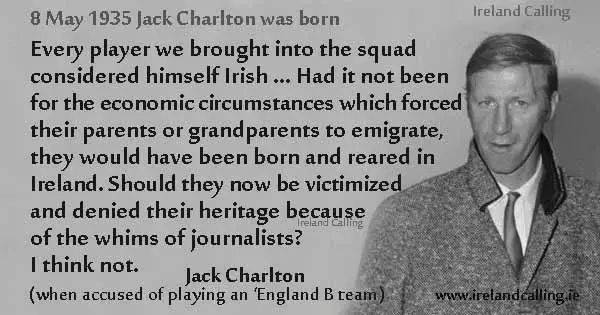
“Every player we brought into the squad considered himself Irish. Had it not been for the economic circumstances which forced their parents or grandparents to emigrate, they would have been born and reared in Ireland. Should they now be victimized and denied their heritage because of the whims of journalists? I think not.”
Click here to read about more top Irish sports stars
* * *
1958 Happy birthday to Roddy Doyle, born in Dublin on this day in 1958. He is a writer and has had several of his books made into films such as The Commitments in 1991, a story about a group of Dublin youths who try to make it as a soul band.
Doyle also won the Booker Prize in 1993 for his novel Paddy Clarke Ha Ha Ha, and his next book, The Woman Who Walked Into Doors has been adapted for the stage and performed many times.
Click here to read about more great Irish writers

* * *
1987 The IRA attacked a Royal Ulster Constabulary base in Northern Ireland on this day in 1987. They drove a digger containing a bomb and a van through the perimeter fence and jumped out of the vehicles and opened fire on the building.
They were met with the military force of the SAS, who returned fire from various hidden locations around the base. Eight men of the IRA were killed in the gunfight. The bomb detonated and wounded three members of the RUC, as well as causing substantial damage to the RUC base.
The incident became known as the Loughgall Ambush, and was the one conflict that was the loss of most IRA lives during the ‘Troubles’ in Northern Ireland.
may-bottom.html